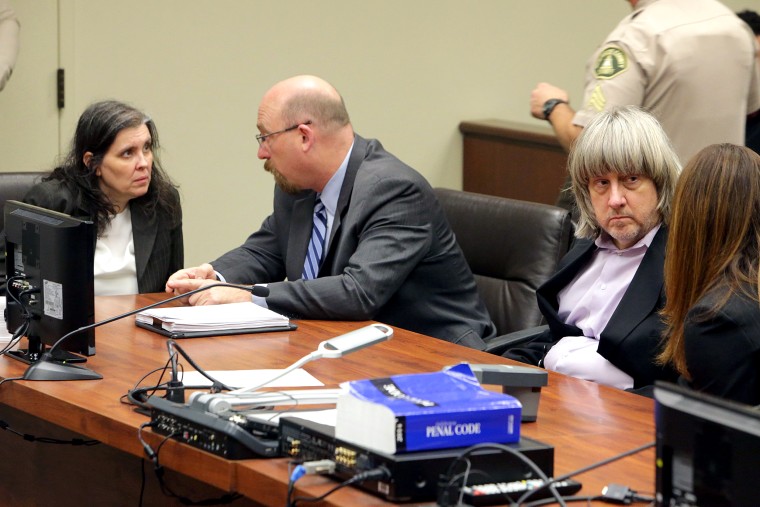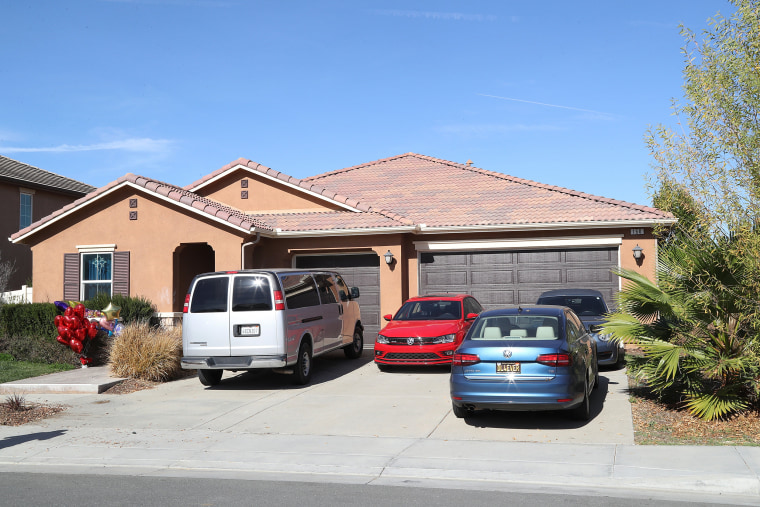LOS ANGELES — The disturbing discovery of 13 starving siblings held in a Southern California home has made many question how something so horrific could happen in suburban America.
The fact that the home was registered as a private school has raised questions about state oversight of homeschooling.
California only requires a private school affidavit to establish a “private school,” as David Allen Turpin had done for years. He and his wife, Louise Anna Turpin, are accused of holding their children captive, shackled at times, rarely allowing them outside and restricting them to one rationed meal a day, authorities said.
An affidavit simply lists the size of the school and the district, who the principal is, and that the private school authorities are responsible for initiating contact with local authorities about a business license, safety and fire standards and other matters.
"The truth is there are very few states that do have oversight" of home schools, said Rachel Coleman, executive director of the Coalition for Responsible Home Education.
California is among 15 states that only require a private school affidavit or other form, she said.
The horrifying conditions allegedly found at the Turpins' Perris, California, home has prompted California Assemblyman Jose Medina, D-Riverside, to plan a bill that would provide a legislative solution.
"I am extremely concerned about the lack of oversight the State of California currently has in monitoring private and home schools," Medina said in a statement.
His communications director, Kelly Reynolds, said Medina will be meeting with the state department of education and others next week and will file a bill by the Feb. 16 deadline for the current session.
No state agency regulates or oversees private schools in California. The California Department of Education said in a statement this week that it is "sickened by this tragedy" but the department "does not approve, monitor, inspect, or oversee private schools" but would "gladly" work to change the laws.
Documents show that David Turpin filed private school affidavits, including in October of 2017, listing him as the principal of "Sandcastle Day School" and with a yahoo account as an email address.
Related: Teen who escaped California torture house overcame tremendous odds
Private schools are subject to an annual inspection by the state or local fire marshal. But the Turpins never alerted Perris city officials they were operating one at their home, Fire Marshal Dave Martinez told NBC News this week.
"It's a home-school so it's not licensed," he said. "If it was a licensed facility, it would trigger our inspections."
The superintendent of the Perris Union High School District said this week that the district has no oversight of home schools. An official with the Murrieta school district, where the Turpins used to live and where David Turpin also previously filed an affidavit for a private school, also said the district had no involvement.
Perris Union High School District Superintendent Grant Bennett said his district is not told when a private school is operating in the district. He thinks the law should be changed. "Someone need to be overseeing this," he said Friday.
Related: Siblings held captive in California home allowed to eat once a day, shower once a year
Scott Roark, a spokesman for the California Department of Education, said the policy is that after a private school affidavit is filed noting six or more students, a federal code is generated for that school and the local district is notified. The local district usually sends a letter to the school that its eligible for federal assistance, but the school does not have to respond, and some don't.
"That's the extent of the contact between the LEA [Local Educational Agency] and the private school," Roark said in an email. "The LEA is not required to physically check on the private school."
Coleman said her group, which advocates for responsible home schooling, wants a requirement that home-schooled children in California have some sort of annual assessment by a mandated reporter so that abuse or neglect can more easily be identified.
"That would ensure that the child is in the presence of a mandated reporter at least once a year," Coleman said. She and the legislative policy analyst for the group wrote an op-ed in the Los Angeles Times this week about abuse in the home-school system.
"We recommend requiring the sorts of things that responsible home-schooling parents already do," said Coleman, who was home-schooled herself from kindergarten through 12th grade in Indiana. "Our goal is not to make it harder for those parents to home-school, our goal is to make it harder for parents like the Turpins to home-school,” she said.
Related: California home where 13 siblings held captive had not been inspected
California law does not explicitly mention home-schools, leaving the intent of the state legislature up to interpretation by courts.
In a 2008 appellate court decision hailed by home-schooling advocates as affirming the right of Californian parents to home-school their children, the court wrote that the state legislature has never explicitly permitted home-schooling, but implied that it is permitted.
The situation "has resulted in a near absence of objective criteria and oversight for home schooling," the court wrote.
"California implicitly allows parents to home school as a private school, but has provided no enforcement mechanism. As long as the local school district verifies that a private school affidavit has been filed, there is no provision for further oversight of a home school," the appellate justice wrote in the 2008 opinion.

It does not appear that any significant changes to California’s private schools law has been made since that decision.
The alleged conditions at the Turpins' home came to light early Sunday after a teenage girl managed to escape the home and tell police that her 12 brothers and sisters were being held by her parents, authorities said.
Both Turpins are charged with 12 counts of torture, seven counts of abuse on a dependent adult, 12 counts of false imprisonment and six counts of child abuse, Riverside County District Attorney Mike Hestrin said. David Turpin was hit with an additional charge of committing a lewd act on a child by force. They are being held in lieu of $12 million bail.
Debbie Schwarzer, an attorney who works with the The HomeSchool Association of California, said she opposes any law that would require an annual visit by a mandated reporter as an intrusion of privacy.
"This case has nothing to do with education, and everything to do with parents who are hell-bound on criminal activity and hiding their children from the world," she said, referring to the Turpin case. She said changes to the law could put the state into the homes of law-abiding parents across the state, and could single home-schooling parents out for an "intrusive inspection."
The abuse of the Turpins' children allegedly started during the 17 years the Turpins lived near Fort Worth, Texas, and intensified when they moved to California in 2010. It "started out as neglect" and became severe, pervasive child abuse, Hestrin said.
Neighbors of the Turpins’ Perris home told NBC Los Angeles that they knew the family had many children but that they weren't sure how many because "the kids didn't come out very often."

Juana Aguilera, a spokesperson for Los Angeles Department of Children and Families who said she spent 14 years as a social worker and supervisor, said that neighbors should always report suspected abuse. Reports can be made on a hotline and, by law, reporters’ information cannot be disclosed.
"All you have to do is suspect something is going on; you don’t have to know for sure,” Aguilera said. Los Angeles County gets about 200,000 calls a year, she said.
“People will tell you, 'I suspected something … but I don’t want to get in trouble, I don’t want to get harassed' — because they don't know that their information is anonymous,” Aguilera said. “Child safety should be everyone's priority."